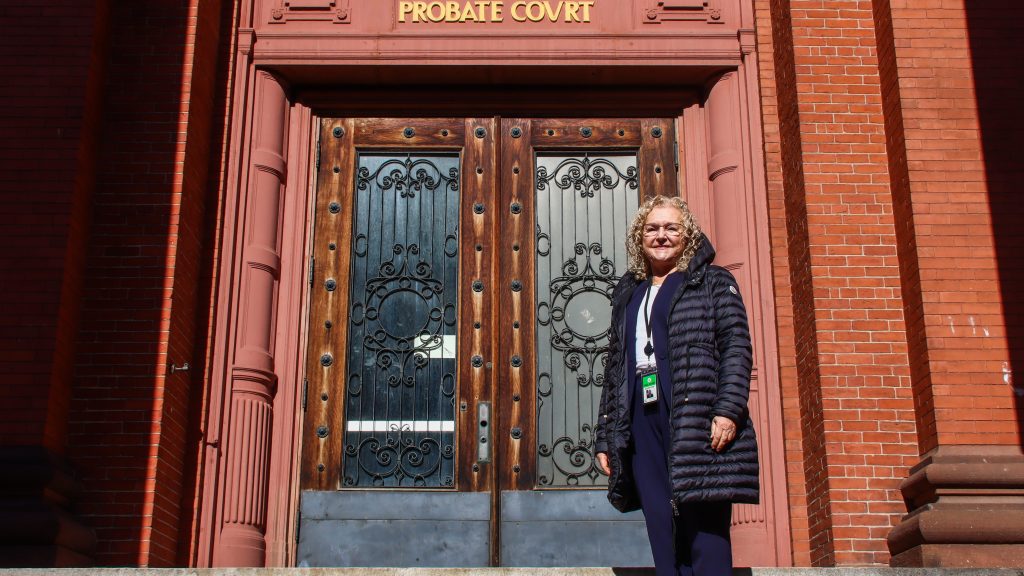MA Latino News covers the social determinants of health and democracy. Collaborations like the partnership with Boston University’s Department of Journalism in the College of Communication is integral to the health of news and the health of democracy.
When her daily pay rate finally increased after 17 years, Gema Schaff bought a new pair of shoes.
The 75-year-old Spanish language court interpreter, originally from Havana, was able to upgrade her wardrobe with new flats for work. It was part of her goal to replace “some really worn out” warm-weather shoes.
“The [other shoes] look really old, and the first thing I thought was: I can get new shoes,’’ Schaff, who currently lives in Cambridge, said.
The new shoes were a small victory for Schaff, who helped successfully advocate for a long overdue wage increase for herself and other Massachusetts court interpreters hired to do daily translation work. It is a battle these interpreters have been waging for years — and earlier in February they staged a walkout highlighting their plight.
Three of the women who participated in the walkout recently described their long quest for fairer pay and said their efforts are far from over.
Before this year, Massachusetts court per diem interpreters — mostly immigrants, some in their 60s and 70s — had not had a pay raise since 2006. For 17 years, they were paid $200 to $300 per diem for translating court proceedings to defendants in criminal and civil court cases.
“The feeling was of complete helplessness,” Schaff said about the years of advocating for higher pay for per diem workers. “There was nothing we could do to get a fair pay.”
Interpreters are an essential part of court proceedings, often traveling across the state to provide courtroom translation services for people with limited English proficiency.
They translate predominantly in Spanish, but also in Vietnamese, Portuguese, Haitian, and Chinese languages, such as Mandarin and Cantonese.
“In the trial court … you really have the opportunity to help people,” Schaff said. “If you are in a position to help somebody in such a stressful situation, I think you’re very privileged.”
Genevieve Howe, a 65-year-old Spanish interpreter of 12 years, said the idea for protesting their low wages had been circulating for many months before the interpreters settled on a date for the five-day walkout.
“We’ve been badgering our office for years to correct the compensation rates,’’ said Howe of Dorchester. “The walkout, clearly, got us the attention that we needed.”
Per diem interpreters alerted court officials about the walkout to ensure that defendants were being serviced, and met with the state’s new trial court administrator, Thomas Ambrosino, on Feb. 1.
Ambrosino approved increasing the pay to $300 for half-day and $450 for full-day certified interpreters along with $200 for half-day and $300 for full-day screened interpreters. This increase is retroactive to Jan. 1.
“The Trial Court values the work of all of our interpreters and recognizes that they are integral to providing access to justice,’’ Donahue said.
The interpreters welcomed the increase but said it was not all they had hoped for.
“Some people … felt disappointed that $450 was the number that the courts offered,” Howe said. “It feels like a victory because we’re getting a 50 percent increase which is a nice bump up.”
But the women had sought an increase of around $560 for a full day of work for certified interpreters after consulting with an economist.
They also expressed concern that a state plan to hire 50 new staff interpreters would eliminate the per diem workers who have “been loyally working in the courts’’ without receiving a raise for 17 years, according to a Feb. 4 letter addressed to Governor Maura Healey’s office.
The trial court currently has 65 staff and 90 per diem interpreters, Donahue said.
“I do fear that being largely a group of immigrants and people of color has played some role in the trial court’s failure to pay us the attention that they should,” Howe said in an interview.
Mercy T. Cevallos, the 77-year-old Spanish interpreter of Newton who sent the letter to Healey, wrote that the $450 figure was “unacceptable” and cited a compensation formula that led to the $560 figure.
Without fair pay, Cevallos said she had to tap into her savings to pay her rent, utilities, and general living expenses, which was “emotionally painful.”
Going to court is confusing and stressful, and for people who don’t understand English, the feeling is much worse, said Cevallos.
“We’re buttressing this legal system that requires that people have access to a fair trial,” Cevallos said. “And we would like to have that apply to us as well in compensation terms.”
Per diem interpreters are also not fairly compensated for the travel time required to get to and from courthouses, which can sometimes take one to three hours a day, Howe said.
Ambrosino promised to meet the per diem interpreters again in May to look at the travel time issue, Howe said.
“It’s just a huge relief because it’s been so long with nothing happening and no one paying any attention to us,” Howe said. “It feels really good that we have his ear [and] that we can continue to be in communication with him.”
This story was published as part of a collaboration with Boston University’s School of Journalism in the College of Communication. The student journalist is a member of a Reporting in Depth class taught by former Boston Globe reporter Meghan Irons.

Clare Ong is a Sophomore studying Film & Television and Journalism at Boston University. She is a 20-year-old international student from Singapore who came to the U.S. to pursue her dreams of working in the film and media industry. She hopes to be a filmmaker, photographer, or documentarian in the future and aims to tell powerful stories through her work.




